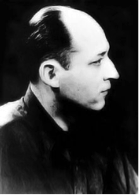 The French poet Benjamin Péret was one of the founders of the French Surrealist movement in art. He employed surrealist automatism in his writing, which probably sat well with his membership of the Parisian Dadaist movement which he joined after the end of the First World War. Dadaists were European avant-garde writers and artists who concentrated on experimental and innovative methods of expressing their art. He was very much the revolutionary with left wing tendencies that got him into trouble on occasions, a notable example being when he was jailed in 1940 by the French authorities who took exception to his extreme political views and activities.
The French poet Benjamin Péret was one of the founders of the French Surrealist movement in art. He employed surrealist automatism in his writing, which probably sat well with his membership of the Parisian Dadaist movement which he joined after the end of the First World War. Dadaists were European avant-garde writers and artists who concentrated on experimental and innovative methods of expressing their art. He was very much the revolutionary with left wing tendencies that got him into trouble on occasions, a notable example being when he was jailed in 1940 by the French authorities who took exception to his extreme political views and activities.
Benjamin Péret was born in July 1899 in the small town of Rezé which is in western France in the Loire-Atlantique département. Education authorities seem to have had little power at that time as Péret opted out of school voluntarily, mainly because he just didn’t like to be there. He tried, instead, the art school in his hometown when he was aged 13. As before, he found himself unmotivated and unwilling to put in the work, so left there within the year. Perhaps he had more practical studies in mind, so enrolled at a school of Industrial Design.
This too was cut short though, only this time because of the outbreak of World War I. Péret joined a cavalry regiment, known as the Cuirassiers, although this kind of soldiering was very much out of touch with the mechanised warfare that was soon to be adopted during this conflict. His military career eventually took him to the Balkans and Salonica in Greece. He was an admirer of the work of fellow French soldier Apollinaire and he began to compose his own poetry. Here is an example of his wartime poetry – a savage but satirical swipe at all of those who called this “The Great War”. It is called Little Song of the Maimed:

He did not serve until the end of the war, having contracted dysentery in Greece and, as a result, being sent home to recuperate.
Immediately after the war he joined the above-mentioned Dada movement and there followed, in 1921, his first published collection of poems which was called Le Passager du Transatlantique. Shortly after this, he dropped out of the Dadaist movement, preferring instead to follow the emerging Surrealist movement. He particularly admired the work of André Breton, and also worked alongside a Mexican writer called Octavio Paz.
He emigrated, with his wife, to Brazil in 1929 but for only two years though because he was arrested and deported from the country accused of being a “communist agitator”. His formation of the Brazilian Communist League, in association with his brother-in-law, was too much for the Brazilian authorities. The group followed the teachings and ideals of the Russian Leon Trotsky.
On his return to France, his politics remained a driving force behind his work and ideals, and he decided to join the Republican army fighting the Spanish Civil War. In 1940, he was on the move again, this time to Mexico, where he embarked on a study of pre-Columbian myths and American folklore. Here he associated with exiled Europeans including the widow of Leon Trotsky – Nathalia Sedova. He enjoyed seven years in Mexico before, once again, returning to his homeland where he lived for the rest of his days.
Benjamin Péret died in Paris in September 1959, aged 60.

